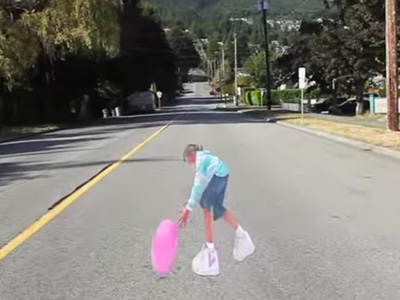How can we use a little psychology to get you to slow down when you’re driving? You’d be surprised. Very often road signs like “Slow” or a posted speed limit of, say 20 mph does not work. Drivers go past these signs and nothing bad happens so after a while they’re ignored. We try to make it more personal with signs say, “Drive as if your kids live here”, but often that doesn’t work. How about something trickier: what if we enlisted the help of those 3D sidewalk artists? What could they possibly do? You’ll find out.
Resources for this Episode
-
- The Preventable website – the organization that created the 3D anamorphic image of the girl on the street (check the video below).
- Town in Iceland Paints 3D Zebra Crosswalk To Slow Down Speeding Cars
- Ep 188: Psychologists Are Keeping You From Getting the Flu
- Depth Perception – How Your Brain Sees What’s Not There
This [the anamorphic drawing of the girl playing in the street] is a way to reinvigorate what becomes a pretty tired message every year. We become anesthetized to the risks related to driving, but the risks are very real, especially in British Columbia, where we have more than 400 fatalities each year related to motor vehicles,” said David Dunne, Director of the Traffic Safety Foundation and spokesperson for Preventable.





Michael
December 29, 2015That’s a great example! I can see myself slowing down just to see the green face. Your mention of gamification reminded me that I talked a little bit about this idea of getting people to drive more safely using gamification in this episode. Your example is right on the nose – thanks Vera.
Vera
December 29, 2015Hi Michael,
I listened to your recent episode today and found it very interesting. Apparently the strategies used also vary over the countries.
I’d like to add one idea how psychology is used to slow us down over here in Germany: the idea of gamification.
Simple speed cameras (which are not accurate enough to issue speeding tickets) are installed in villages or residential neighbourhoods and connected to an LED screen. If you drive faster than allowed, the screen shows a frowny face. If you slow down as required, you are rewarded with a green smiley face, sometimes even a “thank you” note.
I often catch myself slowing down to avoid or stop the frown (i. e. classic negative reinforcement, right?)
What do you think of this?
Thanks once again for your great show
Vera